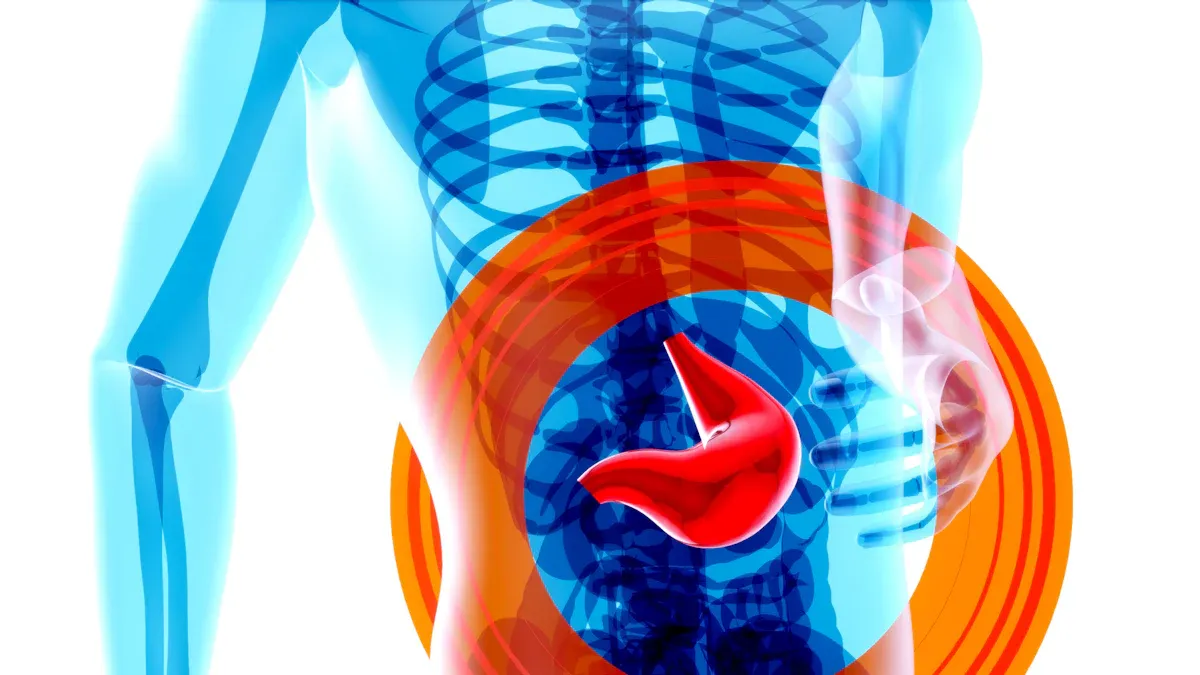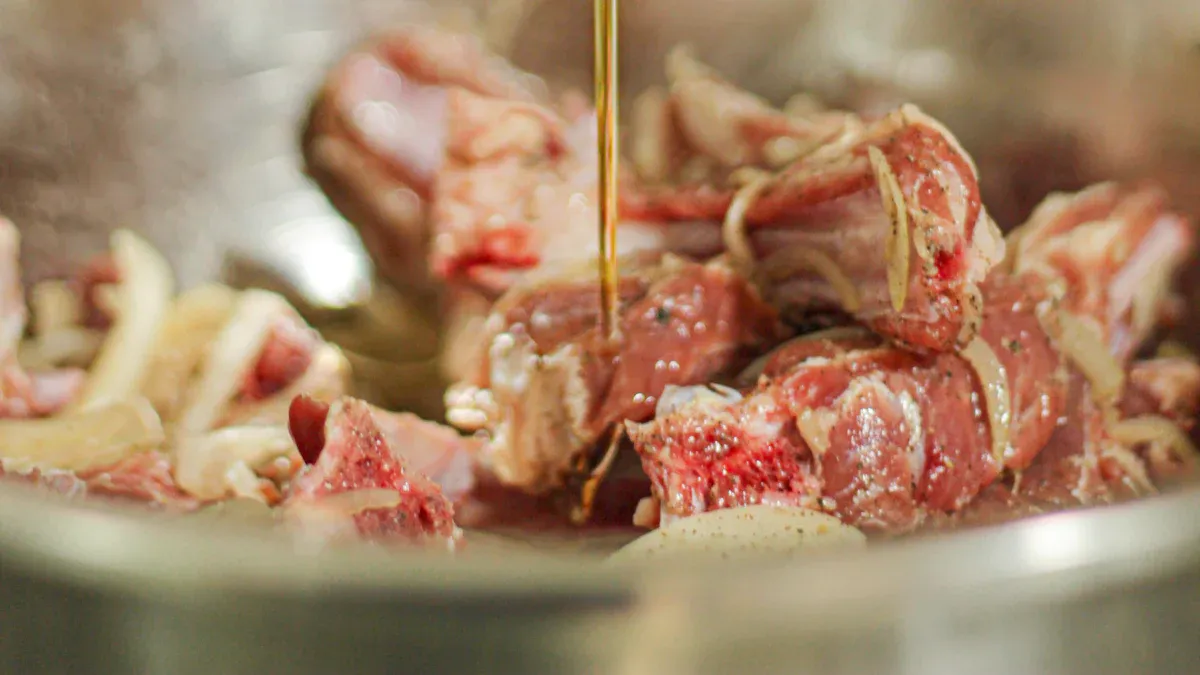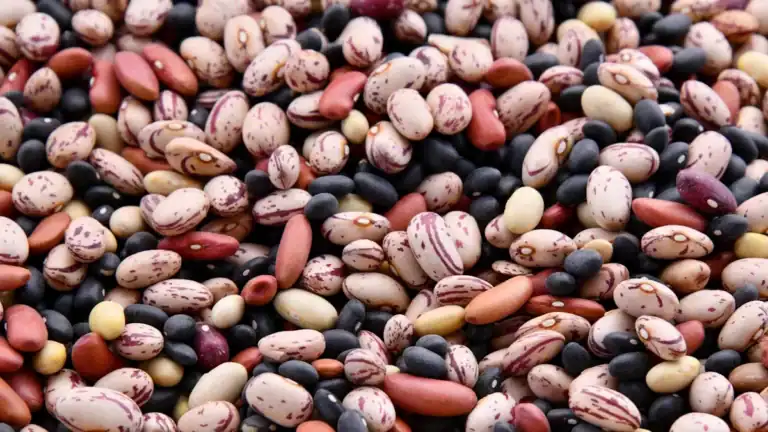
Can you really help your gut by eating only animal foods? Many people try the carnivore diet to help with digestion problems. You might notice big changes in your gut health. Look at this table—97% of people with gastrointestinal conditions say they feel better after starting an animal-based diet.
People want real answers when their stomach hurts or food makes them feel bad. That is why this way of eating gets a lot of attention.
Carnivore Diet and Digestion

Who Benefits
You may ask who gets help from the carnivore diet. People with hard health problems often want to feel better. If you have an autoimmune condition, a digestive disorder, or skin issues, you might see changes. Check this table to find out which groups get the most help:
Health Condition | Description |
|---|---|
Autoimmune conditions | Such as rheumatoid arthritis, psoriasis, lupus |
Digestive disorders | Including Crohn’s disease |
Skin conditions | Like acne and eczema |
Diabetes | Management and symptom relief |
Mood disorders | Such as anxiety |
People with Crohn’s disease or ulcerative colitis often try this diet to help their gut. Some people with diabetes or mood problems say their symptoms get better. Eating only animal foods means you skip many plant triggers.
Tip: If your stomach hurts or your digestion is not steady, try writing down your symptoms before and after you change your diet. Many people like to keep a journal.
Common Issues Helped
You may want to know what problems this diet helps. Many people say they feel less bloated and have less pain. Here are some common issues that get better:
Long-term gut problems like Crohn’s disease and ulcerative colitis
Trouble from plant foods, such as gluten, lectins, and fiber
Inflammation, especially for people with IBS
Stomach pain and bloating
Eating only animal foods takes away things that can upset your gut. This gives your body time to rest and heal. People often say their stomach feels better and they have more energy. A survey in 2021 asked over 2,000 people about the diet. Many said their stomach problems, tiredness, and even thinking got better.
You may also notice changes in your skin or mood. Some reports show big improvements for people with SIBO, type 1 diabetes, and Crohn’s disease. The diet’s simple plan—removing gluten and phytates—may help your gut get stronger.
Let’s see how different meats affect your gut:
Type of Meat | Effect on Gut Health |
|---|---|
Red Meat | Linked to higher death rates and long-term diseases; may raise risk of colon cancer. |
White Meat | Might help keep your gut healthy by raising good bacteria. |
Processed Meat | May hurt gut bacteria; not enough studies to know for sure. |
General Findings | Eating too much meat can cause diseases; different meats change gut bacteria in different ways. |
Not all meats work the same way. White meat may help your gut, but too much red or processed meat could be bad. If you want to try this diet, watch how your body feels and pick your foods with care.
What Is the Carnivore Diet

Core Foods
You might wonder what you actually eat on a carnivore diet. The answer is simple: you focus on animal foods. Your plate will fill up with meat, fish, eggs, and sometimes dairy. You can also add animal organs, bone broth, and water. Some people include cheese or butter if they handle dairy well. You leave out all plant foods, so you skip vegetables, fruits, grains, nuts, and seeds.
Here’s a quick look at what you include and what you avoid:
Carnivore Diet Foods | Other Diets Excluded Foods |
|---|---|
Meat | Vegetables |
Fish | Fruits |
Eggs | Grains |
Animal products (e.g., organs) | Legumes |
Bone broth and water | Nuts and seeds |
Dairy (in some cases) |
You get most of your calories from animal proteins and fats. This means you eat ribeye steaks, chicken thighs, and salmon. You might add eggs or bone broth for variety. You do not eat bread, rice, or beans. Your meals stay simple and filling.
Tip: If you want to try a carnivore based diet, start with foods you already enjoy, like steak or eggs. You can add new cuts of meat or fish as you get comfortable.
Key Differences
How does the carnivore diet stand out from other popular diets? You cut out all plant foods, which makes this diet unique. Other low-carb diets, like keto or paleo, let you eat some vegetables, nuts, or seeds. On carnivore, you skip those. You focus only on animal foods.
You avoid plant-based foods that may upset your gut.
You eat only animal products, which may help lower inflammation.
Other diets, like keto, still include some plant foods, which can have compounds that bother your stomach.
You may notice that the carnivore diet is often called a “zero carb” diet. You get almost no carbohydrates. Your body uses fats for fuel instead. This can feel very different from other diets you may have tried.
Sample Meals
You might ask, “What does a day of eating look like?” Here are some meal ideas for a week:
Day | Breakfast | Lunch | Dinner |
|---|---|---|---|
1 | Ribeye steak and eggs | Grilled chicken thighs with bacon strips | Salmon fillet with butter sauce and shrimp |
| 2 | Bacon-wrapped sausages | Turkey legs with skin | Tuna steaks with melted ghee |
| 3 | Chicken liver and eggs | Bacon-wrapped scallops | Ribeye steak with garlic butter |
| 4 | Sausage links with sunny-side-up eggs | Grilled lamb kebabs | Salmon patties with mayonnaise |
| 5 | Ground beef with melted cheese | Chicken thighs with crispy skin | Shrimp scampi with butter |
Note: If you want to support your gut, choose fresh cuts of meat and healthy fats. Avoid processed meats when possible.
Gut Health and the Carnivore Diet
How It Supports Gut Healing
When you eat only animal foods, your gut gets a break. Plant foods can have things that bother your stomach. Taking them out lets your gut rest and heal. Animal foods are easy for your body to use. They give you nutrients that help your gut stay healthy. Nutrients like glutamine and collagen help fix your gut lining. They also help stop leaky gut.
Takes away foods that can hurt your gut, so it can heal.
Helps lower swelling in your gut, which helps it get better.
Stops bad gut bacteria from growing by removing certain carbs.
Eating animal foods gives your body what it needs to heal. Your body uses these nutrients without extra work. If you have leaky gut, you might feel better as you heal. Many people say they feel stronger and have more energy after changing their diet.
Note: Healing your gut takes time. You may not see changes right away, but your gut is working to get better.
Impact on Inflammation
Swelling in your gut can make you feel sick. The carnivore diet can help by taking away foods that upset your immune system. Animal foods have things that calm swelling and help your gut heal. When you eat only animal foods, you skip plant foods that can cause problems for some people.
Here’s how different diets can change swelling in your gut:
Evidence Type | Description |
|---|---|
Negative Impact | Eating lots of animal protein can make harmful stuff in your gut, which can cause swelling. |
Cancer Link | Eating lots of red and processed meat can raise your risk for colon cancer over time. |
Fiber Deficiency | The carnivore diet does not have fiber, which is important for gut health and less swelling. |
Microbiome Change | Eating lots of animal protein can change your gut bacteria, which can make swelling worse. |
You need a healthy gut to feel good. Healing your gut means lowering swelling and keeping your gut lining safe. Animal foods can help some people, but too much red or processed meat can be risky. If you want to help your gut, watch how your body feels with different foods.
Digestive Changes
When you start eating only animal foods, your digestion can change. You might feel gassy or bloated as your body gets used to more protein and fat. Some people get constipated or have loose stools because there is no fiber. Your gut bacteria change when you stop eating plants, and this can cause new feelings.
Gas and bloating can happen as your body gets used to the new diet.
You might notice changes in your poop, like constipation or diarrhea.
Eating lots of animal protein can make you feel full or slow.
Sometimes you might feel sick if your body has trouble with fat.
You may feel weird at first as your body gets used to the new foods.
Your gut bacteria change when you stop eating carbs and eat more animal foods.
You might need help from extra enzymes to digest your food.
A healthy gut needs balance. Healing your gut takes time and your body needs to adjust. Some people feel better from leaky gut, but others may get new symptoms. The carnivore diet helps many people, but you should pay attention to how your gut feels and changes.
Tip: If your digestion changes, write down your symptoms. This helps you see how your gut is healing and which foods are best for you.
Some people talk about plant foods versus animal foods for gut health. Plant-based diets can make your gut bacteria more diverse, which is good for health. A diverse gut helps your body, immune system, and mood. The carnivore diet removes plant foods, which can lower gut diversity and raise health risks because there is no fiber. Some people heal with animal foods, but others need plant foods for a healthy gut.
Benefits for Gut Health
Symptom Relief
You want your stomach to stop hurting. The carnivore diet helps many people feel better. Some people notice changes fast. People with Crohn’s disease and ulcerative colitis often have less pain. They go to the bathroom less often and have more energy. Here’s some research I found on the subject and Look at this table to see what happens when people eat only animal foods:
Patient | Condition | Symptoms Before | Symptoms After | Additional Notes |
|---|---|---|---|---|
TH | Crohn’s | Urgency, pain | 99% improvement | No signs of activity on colonoscopy |
IA | IBD | 8-10 loose stools | 1 formed stool | Complete remission for 6 years |
MI | UC | Residual symptoms | Symptoms disappeared | Discontinued mesalamine |
NE | Crohn’s | Diarrhea, bloating | Formed stools | Remission after decades |
OS | IBD | High calprotectin | No symptoms | Calprotectin dropped significantly |
These stories show real relief. People talk about fewer flare-ups and better control. You may feel calmer and your stomach may work better.
Tip: If you want to see your own progress, write down your symptoms every day. This helps you notice changes and spot patterns.
Fewer Irritants
You take away many things that bother your stomach when you eat animal foods. Plant foods have gluten, lectins, and fiber. These can cause swelling, bloating, and pain for sensitive stomachs. Eating only meat gives your gut a break from these things.
The diet removes all plant foods, so you skip things that can hurt your gut.
You do not eat gluten, lectins, or fiber, which can cause swelling and bloating.
The carnivore diet takes away foods that make your gut upset.
You avoid plant antinutrients like lectins and oxalates that can bother your stomach.
No fiber means less fermentation in a hurt gut, so it can heal.
Animal foods have omega-3 fatty acids and vitamins that help your gut.
Foods like bone broth have collagen, which helps fix your gut lining.
You feel better by removing these triggers. Your gut gets time to rest and heal. You may feel less bloated and more comfortable after eating.
Autoimmune and IBS
You might have autoimmune problems or IBS. The carnivore diet can help you feel better if you have these issues. Studies show plant compounds like lectins make swelling worse for people with IBS and autoimmune diseases.
“Studies show that lectins make swelling worse for IBS and autoimmune conditions like rheumatoid arthritis. A 2017 study found that plant lectins are part of many swelling diseases, including inflammatory bowel disease, diabetes, rheumatoid arthritis, and celiac disease.”
You take away many things in plant foods that cause swelling, like plant toxins, antinutrients, carbs, added sugars, fiber, FODMAPs, and vegetable oils. This helps your gut heal and lowers flare-ups. You may have fewer symptoms and steadier digestion.
People with autoimmune gut problems often feel better for a long time. You might notice your symptoms go away and you feel free from stomach pain.
Risks and Considerations
Fiber and Microbiome
When you follow the carnivore diet, you eat only animal foods. You skip all plant foods, so you do not get fiber. Fiber is important for your gut health. It feeds the good bacteria in your gut microbiome and helps keep your digestion smooth. Without fiber, your gut bacteria can change. Some people notice less gas and bloating at first, but you might face other problems later.
Here is what happens when you do not eat fiber:
You miss out on carotenoids and polyphenols from fruits and vegetables. These help protect your body with antioxidants.
Your risk for some diseases, like Type 2 diabetes and certain cancers, can go up.
Your gut microbiome may become less diverse, which can affect your health.
Some people say the carnivore diet helps reduce inflammation and supports the gut barrier. You avoid plant foods that can irritate your gut. Your body keeps making mucin, which feeds good bacteria. You may not need as many probiotics because you have fewer irritants.
Long-Term Effects
You may feel better at first on the carnivore diet, but you should think about what happens over time. The lack of fiber can lead to constipation and other digestive issues. Fiber helps lower cholesterol, keeps your blood sugar steady, and helps with weight loss. People who eat more fiber have a lower risk of colon cancer.
Here are some long-term effects you might see:
Constipation or trouble going to the bathroom
Higher cholesterol and blood sugar swings
More risk for colon cancer
Note: You may want to track your digestion and talk to a doctor if you notice problems that do not go away.
Nutrient Balance
You need to keep your nutrients balanced for good gut health. The carnivore diet can help your gut lining by promoting mucin production. You also avoid plant irritants, which may lower inflammation. Animal foods without preservatives can support a healthier gut microbiome.
To keep your body healthy, you should:
Choose a variety of animal foods, like beef, fish, and eggs
Include organ meats for more vitamins and minerals
Drink enough water to help digestion
Tip: If you feel tired or have new symptoms, check if you are missing any nutrients. You may need to adjust your food choices.
You can support your gut health on the carnivore diet, but you need to watch for risks. Pay attention to how your body feels and make changes if needed.
Supporting Gut Health on Carnivore
Best Animal Foods
Choosing the right foods can make a big difference when you want to support your gut. On an animal-based diet, you have many options. Some foods work better for your stomach than others. Fresh, unprocessed meats are a top choice. Beef, lamb, and chicken give you protein and nutrients without extra additives. Fatty fish like salmon and sardines bring healthy fats that help your gut lining. Eggs are gentle on digestion and full of vitamins. Organ meats, such as liver and heart, offer extra minerals and support gut health. Bone broth is another favorite. It has collagen and amino acids that help repair your gut. The following is some research I came across regarding this.
Here’s a quick table of animal foods that support your gut:
Food Type | Gut Health Benefit |
|---|---|
Beef/Lamb | Easy to digest, rich in protein |
Fatty Fish | Omega-3s for gut lining |
Eggs | Gentle, nutrient-dense |
Organ Meats | Extra vitamins and minerals |
Bone Broth | Collagen for gut repair |
Tip: Pick fresh cuts and avoid processed meats to get the most benefits for your gut.
Transition Tips
Switching to the carnivore diet can feel tough at first. Your body needs time to adjust. You might notice changes in your digestion. To make things easier, try these tips:
Gradually lower your carbs while adding more meat and fat. This helps your body get used to the new foods.
Drink plenty of water and keep your electrolytes balanced. This can stop headaches and tiredness.
Add digestive enzymes or betaine if you feel heavy after meals. These help break down protein and fat.
Make sure you eat enough fat. Fat gives you energy and helps you feel full.
You may feel strange during the first week. Your gut bacteria change, and your body learns to use fat for fuel. These steps can help you manage symptoms and keep your gut happy.
Monitoring Progress
You want to know if your gut is getting better. Tracking your progress helps you see what works. Here are some ways to keep an eye on your gut health:
Keep a journal. Write down what you eat and how you feel each day.
Use an app to track your energy, digestion, and mood.
Watch for changes in your bathroom habits, skin, and energy levels.
Note: If you see new symptoms or feel worse, check your journal. You might need to change your food choices or talk to a doctor.
Supporting gut health on a carnivore diet means picking the best animal foods, easing into the diet, and watching your progress. You can help your gut heal by making smart choices and paying attention to your body. Many people find that an animal-based diet gives their gut a break and helps them feel better.
Common Concerns
Fiber Needs
You might wonder what happens when you stop eating fiber. Most people hear that fiber is important for gut health. Experts suggest adults should eat about 30 grams of fiber each day. Most people only get around 18 grams. Fiber comes from foods like cereals, legumes, nuts, vegetables, fruits, and grains. It helps your gut by:
Making your gut bacteria more diverse
Keeping a balance between good and bad bacteria
Helping you go to the bathroom regularly
On the carnivore diet, you do not eat these fiber-rich foods. Some people feel fine without fiber, but others may notice changes in their digestion. If you feel constipated or have trouble with your stomach, it could be because your body misses fiber.
Microbiome Changes
Your gut is home to trillions of bacteria. These tiny helpers break down food and keep you healthy. When you eat only animal foods, your gut bacteria change. Research shows that animals who eat only meat, like leopard cats and otters, have less variety in their gut bacteria than animals who eat plants. In these carnivores, certain bacteria like Clostridiaceae and Peptostreptococcaceae become more common. You might see a similar pattern if you follow a strict animal-based diet. Less variety in your gut bacteria can mean fewer good bacteria to help your body. This change may affect how you feel and how your body works.
Digestive Upset
Many people notice digestive changes when they start a new way of eating. The most common problems on a carnivore diet are constipation and nausea. Here’s a quick look at what you might face and what can help:
Digestive Upset | Description | Suggested Remedies |
|---|---|---|
Constipation | Happens when your body adjusts to less fiber and more fat. | Drink more water, eat more fat, cut back on protein, avoid dairy, try magnesium citrate, sip bone broth, do light exercise. |
Nausea | Can come from changes in gut bacteria or not drinking enough water. | Drink more water, add salt, balance your electrolytes. |
You can manage these issues with a few simple steps:
Drink plenty of water every day.
Add a little more salt to your meals to keep your body balanced.
Try bone broth to help your gut and stay hydrated.
Make changes slowly instead of all at once.
Use supplements like magnesium if you need extra help.
Tip: If you feel sick or have stomach trouble, listen to your body. Take it slow and give yourself time to adjust.
You’ve seen what the carnivore diet can do for gut health. You may notice less inflammation and stronger digestion, but you could face changes in your gut bacteria. Here’s what you should keep in mind:
The diet may mend a leaky gut and calm symptoms like eczema or IBS.
You might risk gut dysbiosis or trouble adapting to other foods.
Tip | How It Helps Your Gut |
|---|---|
Bone Broth | Repairs gut lining |
Raw Milk | Adds good bacteria |
Fermented Foods | Boosts microbial diversity |
Think about your own needs. Talk to a doctor before making big changes. Try adding bone broth to your meals for extra support.




